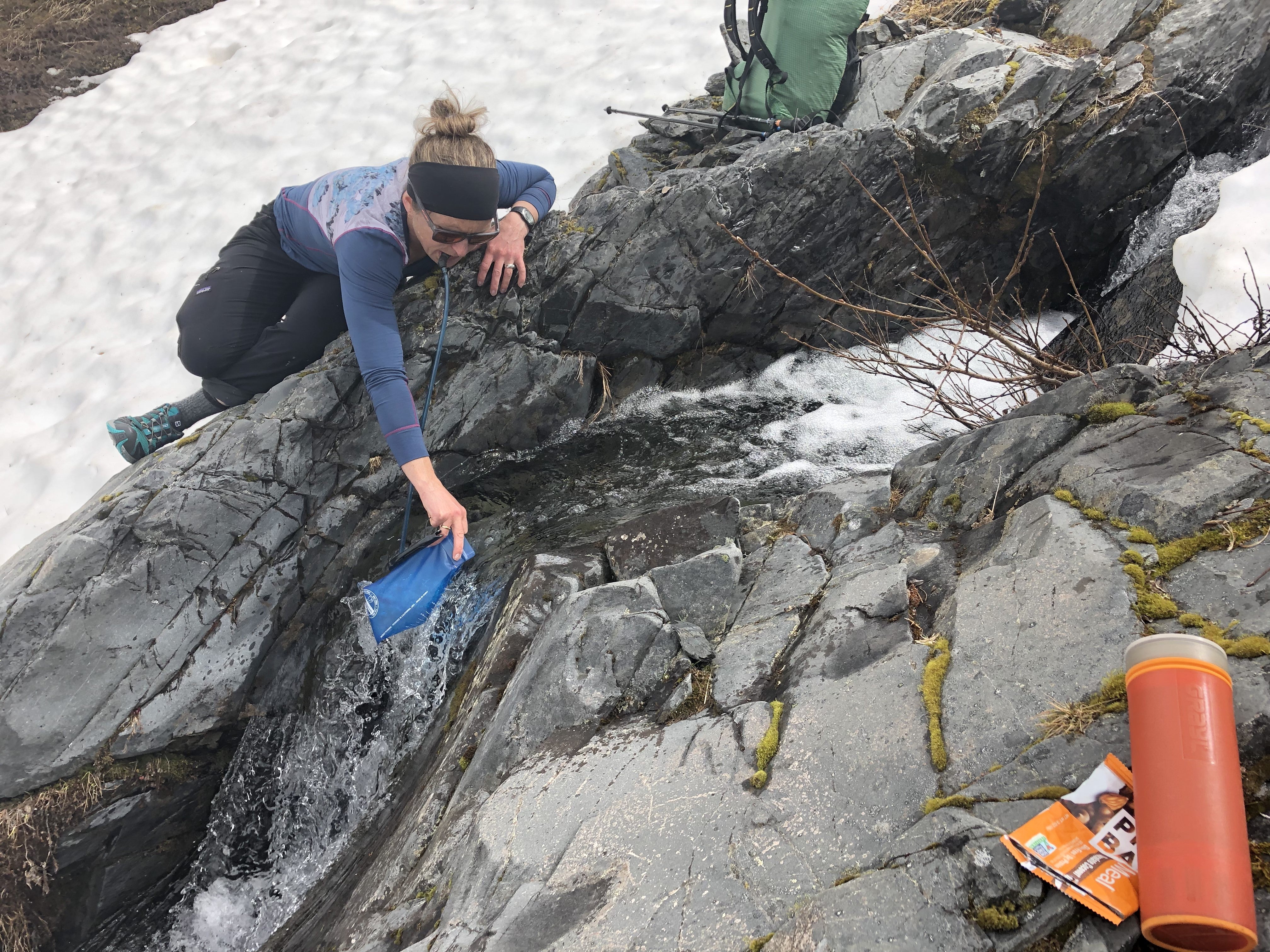When you're out camping, access to clean water is essential. While it's possible to bring along your Nalgenes, this becomes too heavy for longer adventures so a better option is to use a water filtration system. There are many different types of water filtration systems for camping. Some are designed for backpacking and are lightweight and compact. These are ideal for trekking and can easily be carried in a backpack. Other systems are designed for car camping, and are larger and more heavy-duty.
The most basic filters have a mesh or pad that traps larger debris such as twigs, leaves, pine needles etc that might have landed in your water source but do not protect against bacteria, viruses and parasites. Some filters use activated carbon to remove chemical contaminants and other impurities; this was very popular for a while.

Most recently, membrane technology has improved dramatically to the point where I wouldn’t use anything else. I have fully embraced newer filters and I often rely on a single filter and a squeezy water bottle for a 1 week trek and 2 people. This dramatically saves on weight and space and the convenience is unbeatable. I foresee some small improvements in bulk and efficiency in the future, but gone are the days of spending an hour awkwardly pumping water from a stream, or waiting forever for the gravity filter to finish a couple liters.
Another type of water filtration system is a water purifier. These devices use ultraviolet light or chemical treatments to kill bacteria and other microorganisms. The most basic and arguably lightest is the iodine chemical treatment. It has a notorious taste and newer chemicals are more palatable. If you can get past the taste, I know some kayakers that will add a couple tablets to a 3 gallon reservoir and away they go. UV wands promise to kill most viruses and bacteria but I have found them to be too expensive and heavy/bulky to warrant general use.

A quick note about winter. Boiling water uses a lot of energy. Melting snow uses even more. Much better to find a stream than to rely on snow to save on gas. It takes an impressive amount of snow to make a liter of water. And remember if you must use snow, try and put some water in the bottom, otherwise you will "burn" the snow which is just a weird taste it takes on. If the snow melts in warm water first it doesn't happen.
No matter what type of water filtration system you choose, it is important to make sure that it is properly maintained. Regularly cleaning the filter and replacing it when necessary will ensure that it works properly.Water filtration systems are an essential part of any camping trip. They provide safe, clean drinking water and allow you to enjoy the outdoors without worrying about water-borne illnesses. With the right system, you can have peace of mind knowing that your drinking water is safe and free from contaminants and avoid getting the runs!





2 comments
Olmo
MY TESTIMONY ON HOW COINSRECOVERYWORLDWIDE HELP ME RECOVER BACK MY LOST CRYPTO
Yesterday, I confirmed the recovery of my scammed coins.. I just want to put this out there that this is possible and not a miracle.. I was scammed of $35,000 btc and I was blocked off the account.. It was a problem for me, not being able to access my money and my account regardless of speaking to the help service COINSRECOVERYWORLDWIDE . Thanks to coinsrecoveryworldwide at gmail dot com or 📞 +1(737)368-8915(whatsapp). Today being 2nd January 2025 am a happy man for having all my funds back in my position COINSRECOVERYWORLDWIDE keep to there words and handle the situation with a good technology
©2025 COINSRECOVERYWORLDWIDE
101 N BRAND BLVD. 11TH FLOOR GLENDALE CA 91203. #investing #financialfreedom #crypto #bitcointrading #investmentstrategy #altcoins #bitcoinnews #investor #bitcoinprice #bitcoinmining #bitcoinexchange #bitcoinwallet #bitcoincommunity #bitcoinmarket #bitcointrader #bitcoinbusiness #bitcoinexpert#BITCOINSRECOVERY #STOLENBITCOINS #FOREX #USDT
Patricia Lovick
How To Recover Your Bitcoin Without Falling Victim To Scams: A Testimony Experience With Capital Crypto Recover Services, Contact Telegram: @Capitalcryptorecover
Dear Everyone,
I would like to take a moment to share my positive experience with Capital Crypto Recover Services. Initially, I was unsure if it would be possible to recover my stolen bitcoins. However, with their expertise and professionalism, I was able to fully recover my funds. Unfortunately, many individuals fall victim to scams in the cryptocurrency space, especially those involving fraudulent investment platforms. However, I advise caution, as not all recovery services are legitimate. I personally lost $273,000 worth of Bitcoin from my Binance account due to a deceptive platform. If you have suffered a similar loss, you may be considering crypto recovery, The Capital Crypto Recover is the most knowledgeable and effective Capital Crypto Recovery Services assisted me in recovering my stolen funds within 24 hours, after getting access to my wallet. Their service was not only prompt but also highly professional and effective, and many recovery services may not be trustworthy. Therefore, I highly recommend Capital Crypto Recover to you. i do always research and see reviews about their service, For assistance finding your misplaced cryptocurrency, get in touch with them, They do their jobs quickly and excellently, Stay safe and vigilant in the crypto world.
You can reach them via email at Capitalcryptorecover@zohomail.com